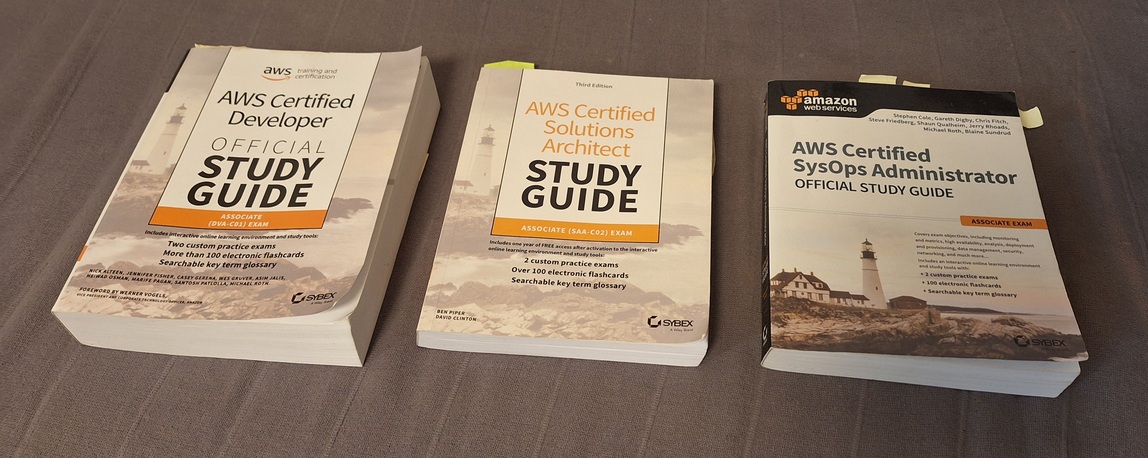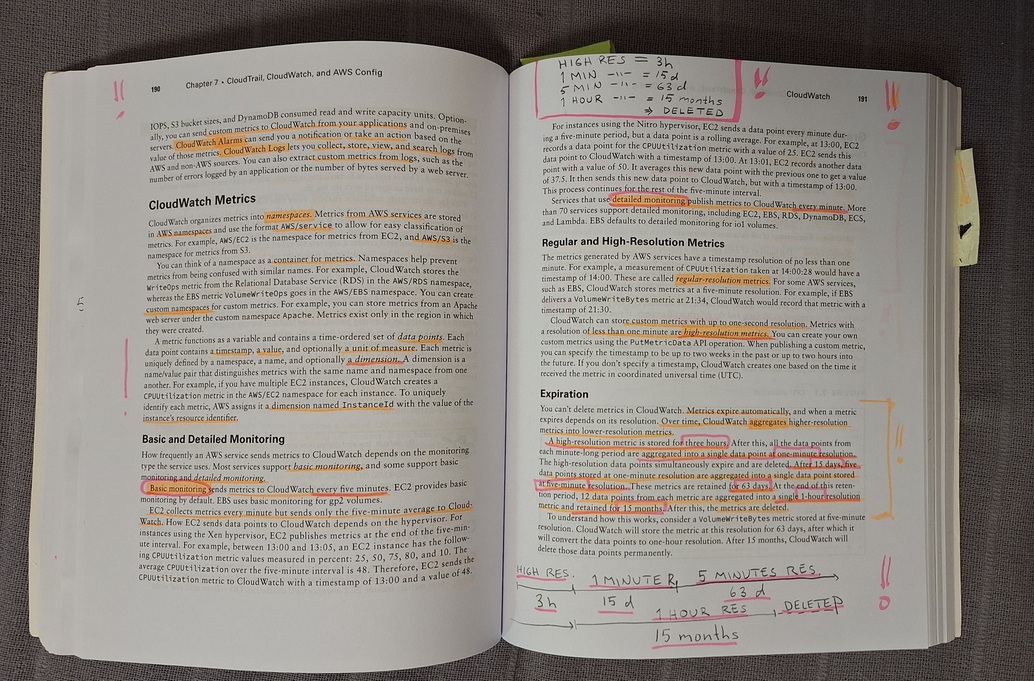Five AWS Exams in Seven Weeks

My AWS Certification Study Guide Books.
Introduction
This autumn I did five AWS certifications in about seven weeks (including the time I spent in studying for the exams), and passed all exams. Sounds heavy, but considering my about 10 years of AWS experience, and the fact that the most difficult of those certifications I have recertified already several times, the task was not that difficult or heavy.
In this blog post, I will tell you about the certifications I did and how I prepared for them.
By the way, you can check my certifications status in the About page. There are also links to the certification badges.
Why Five Certifications in Seven Weeks?
There were four reasons for doing five certifications in seven weeks:
- I was between projects and had some time to study - therefore I could spend work time for studying.
- My corporation had a new target that certain business units should have a certain number of certifications.
- Some of my certifications were about to expire, and I wanted to recertify them before they expired.
- There is some synergy advantage in studying for multiple aws certifications at the same time and taking the exams in a short period of time, since the topics are somewhat overlapping.
Let’s next go through the certifications I did and how I prepared for them.
Exam 1: AWS Certified Cloud Practitioner
AWS Certified Cloud Practitioner was the first certification I did. It is the most basic certification in AWS. It is not that technical certification, but it is more about the general knowledge of AWS services and how AWS works. The exam is quite easy if you have a lot of experience with AWS services as I have.
I was not planning to do this certification, but as I already told earlier, my corporation had a new target that certain business units should have a certain number of certifications - therefore a reason to take the exam, since this aws certification is a “low hanging fruit” if you already have a lot of experience in AWS.
Studying was not difficult. I just read the AWS Certified Cloud Practitioner (CLF-C02) Exam Guide, and then googled some topics I wanted to be sure about.
Finally, I took the Exam Prep Official Question Set: AWS Certified Cloud Practitioner (CLF-C02 - English) test in the AWS Skill Builder site, to validate that I was good to go for the exam.
Exam 2: AWS Certified Developer - Associate
My next goal was to recertify AWS Certified Developer - Associate which was about to expire. I had done this certification exam already a couple of times, so I knew how to prepare for it.
I read the AWS Certified Developer Official Study Guide: Associate (DVA-C01) Exam book. The book coveres the previous version of the exam (the current Developer Associate exam version is now DVA-C02). But basically, the book also coveres almost all areas you need to know also in the new exam version (the AWS services do not change that much from year to year). I also read the AWS Certified Developer - Associate (DVA-C02) Exam Guide and googled those topics that might not be in the DVA-C01 book or if I was not sure if e.g. some configuration values had changed in some services. Since I had already read the book several times in my previous exams, it was not that difficult to read my markings in the book and take the sample questions at the end of each chapter to validate that I knew the content of the chapter.
Finally, I read the sample questions and took the Exam Prep Official Question Set: AWS Certified Developer - Associate (DVA-C02 - English) at the AWS Skill Builder site, to validate that I was good to go for the exam.
Exam 3: AWS Certified Solutions Architect - Associate
My next goal was to recertify AWS Certified Solutions Architect - Associate which was also about to expire. I had done this certification exam already a couple of times, so I knew how to prepare for it.
I read the AWS Certified Solutions Architect Study Guide: Associate (SAA-C02) Exam book (didn’t find a link to that exact isbn - maybe out of print). The book coveres the previous version of the exam (the current Solutions Architect Associate exam version is now SAA-C03), but once again the book also coveres almost all areas you need to know also in the new exam version. I also read the AWS Certified Solutions Architect - Associate (SAA-C03) Exam Guide and once again I googled those topics that might not be in the SAA-C02 book or if I was not sure if some AWS service had changed a bit. And once again, since I had already read the book several times in my previous exams, it was not that difficult to read my markings in the book and take the sample questions at the end of each chapter to validate that I knew the content of the chapter.
And once again finally, I read the sample questions and took the Exam Prep Official Question Set: AWS Solutions Architect - Associate (SAA-C03 - English) at the AWS Skill Builder site, to validate that I was good to go for the exam.
Exam 4: AWS Certified SysOps Administrator - Associate
This is going to be a bit boring: I just reiterated the same process for the AWS Certified SysOps Administrator - Associate I did with Developer and Architect exams.
I read the AWS Certified SysOps Administrator Official Study Guide Associate Exam (the book cover does not say anything about the version of the exam, I purchased the book around year 2018). Then once again, I read AWS Certified SysOps Administrator - Associate (SOA-C02) Exam Guide and I googled those topics that might not be in my book.
And once again finally, I read the sample questions and took the Exam Prep Official Question Set: AWS SysOps Administrator - Associate (SOA-C02 - English) at the AWS Skill Builder site, to validate that I was good to go for the exam.
Exam 5: AWS Certified AI Practitioner
The next goal was to pass a new exam: AWS Certified AI Practitioner. I googled if there is a similar type of official study guide book for this exam, but I couldn’t find one. Therefore I took the Standard Exam Prep Plan: AWS Certified AI Practitioner (AIF-C01) 18 hours course at the AWS Skill Builder site. The video course covered all areas of the exam. And since the exam is the lowest practitioner level it was not that difficult. I had also previously taken the Stanford Online / Coursera: Machine Learning course and therefore the basic AI concepts were already quite familiar to me. Basically, I just had to learn the various AWS AI services (like Bedrock, SageMaker and so on) for the exam.
And once again finally, I took the Exam Prep Official Question Set: AWS Certified Cloud Practitioner (CLF-C02 - English) at the AWS Skill Builder site, to validate that I was good to go for the exam.
Reading a Book vs Taking a Video Course
I am a bit of an old school type of learner - I prefer reading books. When reading a book, you can mark important text with a highlighter pencil, and write your own notes in the pages of the book. Using a video course for learning you cannot do that - you just passively watch the videos. Below you can find an example of my style when reading a book.

An example page of a certification book after my highlightings and notes.
I have two degrees: Master of Science (M.Sc.), Software Engineering, and Master of Arts (M.A.), Psychology. In psychology, I studied e.g. how human beings study effictively. I have utilized those metalearning capabilities in my career in software engineering ever since, and I consider myself as an effective learner. Example. When you want to rehearse quickly one more time for the exam, it is easy to browse a book with your highlightings and notes. For an 18 hours video course you cannot do the same.
Conclusions
If you have several certifications for a specific cloud, my recommendation is to recertify current certifications and certify new certifications in a time window of a few weeks, or a few months. The different exams always have some common topics and this way you can utilize the synergy advantage effectively in your studies and in the examination tests.
The writer is working at a major international IT corporation building cloud infrastructures and implementing applications on top of those infrastructures.
Kari Marttila
Kari Marttila’s Home Page in LinkedIn: https://www.linkedin.com/in/karimarttila/
